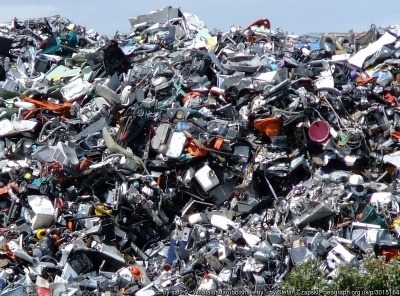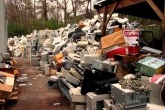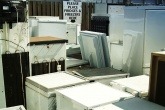MPs launch inquiry into e-waste and the circular economy
Parliament’s Environmental Audit Committee (EAC) has launched an inquiry into the circular economy and electronic waste (e-waste).
Announced today (27 June), the EAC, which considers the extent to which government policies and those of public bodies contribute to environmental protection and sustainability, will investigate the environmental and human health impacts of the disposal of waste electrical and electronic equipment (WEEE) and what is being done to move towards a circular economy for electronic goods.
 The growth in the use and sale of personal electronic devices such as mobile phones, tablets and laptops has led to a dramatic increase in the amount of e-waste generated globally, with 44.7 million tonnes of waste being produced around the world in 2017, 90 per cent of which was sent to landfill, incinerated, illegally traded or treated in a sub-standard way. Half of the e-waste produced globally comes from Europe and the US, with the EU predicted to produce 12 million tonnes by 2020.
The growth in the use and sale of personal electronic devices such as mobile phones, tablets and laptops has led to a dramatic increase in the amount of e-waste generated globally, with 44.7 million tonnes of waste being produced around the world in 2017, 90 per cent of which was sent to landfill, incinerated, illegally traded or treated in a sub-standard way. Half of the e-waste produced globally comes from Europe and the US, with the EU predicted to produce 12 million tonnes by 2020.
E-waste can contain up to 60 different metals and chemicals, which, if disposed of incorrectly, can be hazardous to the environment and human health through contamination of the soil, pollution of water sources and exposing people to toxic substances.
Though exporting e-waste to developing countries is banned, 1.3 million tonnes of undocumented e-waste is estimated to be exported from the EU every year, with the UK ranked as the worst offender in the EU by the Basel Action Network in February this year.
The global dumping of e-waste has led to countries taking action, with Nigeria investing £1.53 million in WEEE recycling to deal with the 1.1 million tonnes of e-waste it receives every year, while Thailand banned the import of e-waste last year in response to fears it was becoming a ‘dumping ground’ for the world’s e-waste.
Read more: Nigeria’s e-waste mountain
Furthermore, the improper disposal and lack of recycling of e-waste also is seeing significant resources leaking out of the economy; global e-waste is estimated to be worth $62.5 billion (£49.3 billion), due to the intrinsic value of the materials used in electronic devices, such as rare earth elements (REEs).
On a domestic scale, the UK produces 24.9 kilogrammes (kg) of e-waste per person, higher than the EU average of 17.7kg. E-waste in the UK is managed under the EU’s WEEE Directive and WEEE Regulations 2013.
As part of those regulations, a producer responsibility scheme is in place, which holds producers financially responsible for the end-of-life management of their products, with annual targets for WEEE collection set by the Department for the Environment, Food and Rural Affairs (Defra).
These targets are calculated based on the WEEE Directive’s target of 65 per cent of the average annual weight of electrical and electronic equipment (EEE) placed on the market over the previous three years. The target for 2019 has been set at 550,577 tonnes, a 12 per cent increase on 2018 levels. The UK missed its WEEE collection target of 537,065 tonnes by 44,500 tonnes in 2018. Where collection falls short of the target, a compliance fee is paid by producers according to market share, which is then put towards projects to increase WEEE recycling and reuse. The total fund for 2017 stood at £8 million.
Scope of the inquiry
Commenting on the launch of the inquiry, Chair of the EAC, Mary Creagh MP, said: “Our old fridges, freezers, computers, TVs, kettles and mobile phones are piling up in a ‘tsunami of e-waste’. New phone launches, cheaper goods, and built-in obsolescence have contributed to the growth of electronic waste in recent years.
“The UK produces more e-waste than the EU average. We are missing EU targets and are one of the worst offenders for exporting waste to developing countries, who are ill equipped to dispose of it in a socially and environmentally responsible way.
“Our attitude to e-waste is unsustainable and the need for radical action clear. We will be investigating the UK’s e-waste industry and looking at how we can create a circular economy for electronic goods.”
The EAC’s inquiry will be seeking answers to the following questions:
Implementing a circular economy for electronic goods
- What steps are being taken to move towards a circular economy for electronic goods? How can the UK Government support this transition?
- What is the environmental and human health risk from e-waste? How significant is it and who is most at risk?
- How can secondary markets for electrical goods be improved? What incentives are required to implement these markets?
- Why does recovering materials from electronic waste pose a significant challenge? What support is required to facilitate the adoption of recovery technologies?
UK’s electronic waste sector
- Are UK WEEE collection targets achievable? What challenges do UK producer compliance schemes and WEEE reprocessors face in meeting the collection targets?
- What causes fraud in the UK’s e-waste system? How can this be addressed?
- What action can the UK Government take to prevent the illegal export of e-waste to the developing world?
- What proposals does the UK Government need to consider as part of its consultation on WEEE?
- Is UK public awareness of e-waste recycling satisfactory? If not, how can it be improved?
If you would like to contribute to the inquiry, written evidence should be submitted through the inquiry page by 5pm on Friday 16 August. 










